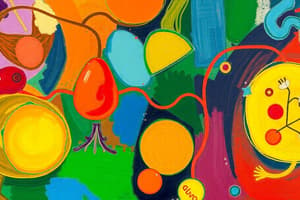Podcast
Questions and Answers
Which of the following statements about gluconeogenesis is true?
Which of the following statements about gluconeogenesis is true?
What type of reaction is characterized by a negative change in free energy (ΔG < 0)?
What type of reaction is characterized by a negative change in free energy (ΔG < 0)?
What role does alanine play in gluconeogenesis?
What role does alanine play in gluconeogenesis?
Which of the following statements about ATP is true?
Which of the following statements about ATP is true?
Signup and view all the answers
What is the first step of gluconeogenesis involving pyruvate?
What is the first step of gluconeogenesis involving pyruvate?
Signup and view all the answers
Entropy (S) in a system is best described as what?
Entropy (S) in a system is best described as what?
Signup and view all the answers
Which enzyme is responsible for converting pyruvate to oxaloacetate in gluconeogenesis?
Which enzyme is responsible for converting pyruvate to oxaloacetate in gluconeogenesis?
Signup and view all the answers
During gluconeogenesis, how is oxaloacetate transported from the mitochondria to the cytoplasm?
During gluconeogenesis, how is oxaloacetate transported from the mitochondria to the cytoplasm?
Signup and view all the answers
What is the significance of ΔG⁰' in biochemical reactions?
What is the significance of ΔG⁰' in biochemical reactions?
Signup and view all the answers
How can endergonic reactions occur if they require energy input?
How can endergonic reactions occur if they require energy input?
Signup and view all the answers
What is the role of fructose-1,6-bisphosphatase in gluconeogenesis?
What is the role of fructose-1,6-bisphosphatase in gluconeogenesis?
Signup and view all the answers
Which statement correctly describes the energy requirements for gluconeogenesis?
Which statement correctly describes the energy requirements for gluconeogenesis?
Signup and view all the answers
How does insulin affect gluconeogenesis?
How does insulin affect gluconeogenesis?
Signup and view all the answers
What is the effect of glucagon on gluconeogenesis?
What is the effect of glucagon on gluconeogenesis?
Signup and view all the answers
Which substance inhibits fructose-1,6-bisphosphatase?
Which substance inhibits fructose-1,6-bisphosphatase?
Signup and view all the answers
Study Notes
Bioenergetics Overview
- Bioenergetics: Study of energy flow in biological systems; focuses on energy harnessing from nutrients for cellular work, growth, and homeostasis.
- Free Energy (G): Determines spontaneity of reactions; negative ΔG indicates spontaneous reactions (exergonic), while positive ΔG requires energy input (endergonic).
- Enthalpy (H): Total heat content of a system; negative ΔH indicates exothermic reactions that release heat, whereas positive ΔH indicates endothermic reactions that absorb heat.
- Entropy (S): Represents system disorder; reactions favor increased entropy, promoting spontaneity.
- Standard Free Energy Change (ΔG⁰'): Measured under specific conditions (1 M concentration, pH 7, 25°C, 1 atm); helps compare energy changes across reactions.
ATP: The Energy Currency
- Adenosine Triphosphate (ATP): Primary energy carrier in cells, storing energy in high-energy bonds; hydrolysis to ADP or AMP releases significant energy (-30.5 kJ/mol).
- ATP hydrolysis drives various cellular processes, including muscle contraction and active transport.
- ATP is regenerated via oxidative phosphorylation and glycolysis.
Coupled Reactions
- Coupling endergonic reactions (ΔG > 0) with exergonic reactions (ΔG < 0), often using ATP hydrolysis, enables energy-required processes.
Types of Biochemical Reactions
- Oxidation-Reduction (Redox) Reactions: Transfer of electrons; oxidation denotes electron loss.
- Catabolic Processes: Breakdown pathways like the oxidation of acetyl-CoA producing energy.
- Anabolic Processes: Synthesis pathways producing biomolecules.
Gluconeogenesis
- Process of synthesizing glucose from non-carbohydrate precursors (e.g., lactate, glycerol, amino acids), essential during fasting or carbohydrate scarcity.
- Occurs mainly in liver (90%) and kidneys (10%).
Precursors for Gluconeogenesis
- Lactate: Converted to glucose in the liver via the Cori cycle, produced during anaerobic glycolysis.
- Glycerol: Derived from triglyceride breakdown, converted to glucose in the liver.
- Amino Acids: Primarily alanine; provides substrates for gluconeogenesis through the Glucose-Alanine cycle.
Gluconeogenesis vs. Glycolysis
- Essentially the reverse of glycolysis with distinct enzymes to bypass three irreversible steps (e.g., pyruvate to PEP).
Key Steps and Enzymes of Gluconeogenesis
-
Pyruvate to PEP:
- Pyruvate carboxylase (requires ATP) converts pyruvate to oxaloacetate.
- PEP carboxykinase (uses GTP) converts oxaloacetate to PEP.
- Fructose-1,6-bisphosphate to Fructose-6-Phosphate: Catalyzed by fructose-1,6-bisphosphatase, a regulatory step bypassing PFK-1 in glycolysis.
- Glucose-6-Phosphate to Glucose: Catalyzed by glucose-6-phosphatase, allowing glucose release into bloodstream; muscle cells lack this enzyme.
Energy Requirements of Gluconeogenesis
- Requires energy input of 4 ATP, 2 GTP, and 2 NADH to synthesize one glucose molecule from two pyruvate molecules.
Regulation of Gluconeogenesis
-
Hormonal Control:
- Insulin inhibits gluconeogenesis; glucagon promotes it.
- Cortisol enhances gluconeogenesis during stress.
-
Allosteric Regulation:
- Fructose-1,6-bisphosphatase regulated by fructose-2,6-bisphosphate and AMP.
- Pyruvate carboxylase activated by acetyl-CoA.
Cori Cycle and Glucose-Alanine Cycle
- Cori Cycle: Lactate from muscles converted to glucose in the liver, returning glucose to muscles.
- Glucose-Alanine Cycle: Alanine from protein breakdown converted into pyruvate and glucose in the liver; aids glucose maintenance during fasting.
Clinical Relevance of Gluconeogenesis
- Hypoglycemia: Impaired gluconeogenesis leads to low blood glucose, potentially due to enzyme defects.
- Diabetes: Dysregulation in gluconeogenesis can contribute to hyperglycemia in type 2 diabetes.
Glycogen Metabolism
- Glycogen: Major glucose storage molecule in the liver and muscles; undergoes glycogenesis (synthesis) and glycogenolysis (breakdown).
Glycogenesis (Glycogen Synthesis)
- Synthesized from glucose primarily in liver and muscle.
- Key steps:
- Glucose to glucose-6-phosphate via hexokinase/glucokinase.
- Glucose-6-phosphate to glucose-1-phosphate via phosphoglucomutase.
- Glucose-1-phosphate to UDP-glucose via UDP-glucose pyrophosphorylase.
Glycogen Storage Diseases
- Pompe Disease: Lysosomal α-glucosidase deficiency; causes muscle weakness.
- Cori Disease: Debranching enzyme deficiency; leads to abnormal glycogen and hypoglycemia.
- McArdle Disease: Muscle glycogen phosphorylase deficiency; causes exercise intolerance.
Clinical Relevance
- Blood Glucose Regulation: Proper glycogen metabolism crucial for maintaining glucose levels; dysregulation may cause hypoglycemia or hyperglycemia.
- Exercise: Glycogen stores in muscles are vital for sustained physical activity; inadequate stores can lead to fatigue.
Integration with Other Metabolic Pathways
- Glycogen metabolism integrates with glycolysis and gluconeogenesis for flexible energy responsiveness.
- Regulated by various signaling pathways, including insulin signaling and AMPK.
Monosaccharide and Disaccharide Metabolism
- Monosaccharides: Simple carbohydrates (e.g., glucose, fructose); crucial for energy and biosynthesis.
- Monosaccharide Metabolism: Converts sugars into forms for glycolysis, TCA cycle, or other pathways.
Glucose Metabolism
- Glycolysis: Converts glucose to pyruvate, generating ATP and NADH.
- Gluconeogenesis: Reverses glycolysis as needed.
- Pentose Phosphate Pathway (PPP): Produces NADPH for biosynthesis and ribose-5-phosphate for nucleotide synthesis.
Studying That Suits You
Use AI to generate personalized quizzes and flashcards to suit your learning preferences.
Related Documents
Description
Test your knowledge on gluconeogenesis with this quiz. It covers key concepts such as the free energy changes, the role of alanine, and the specific reactions involved in gluconeogenesis. Perfect for students studying biochemistry.




